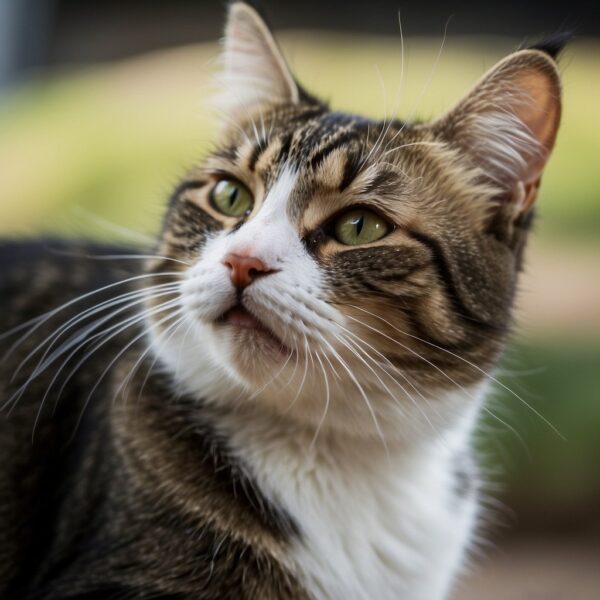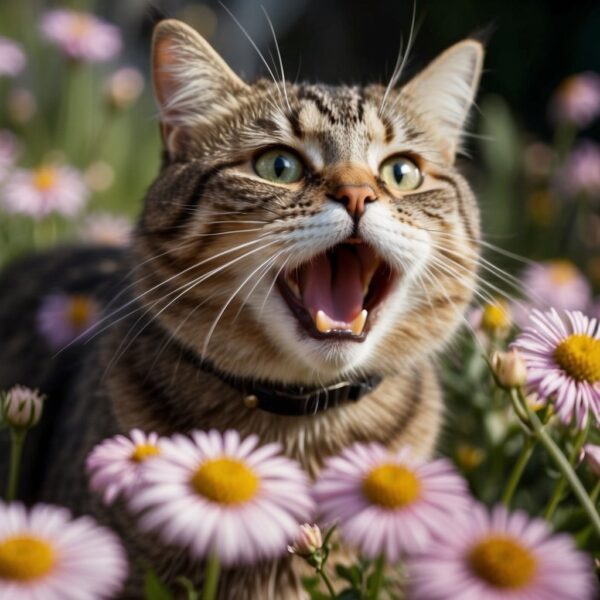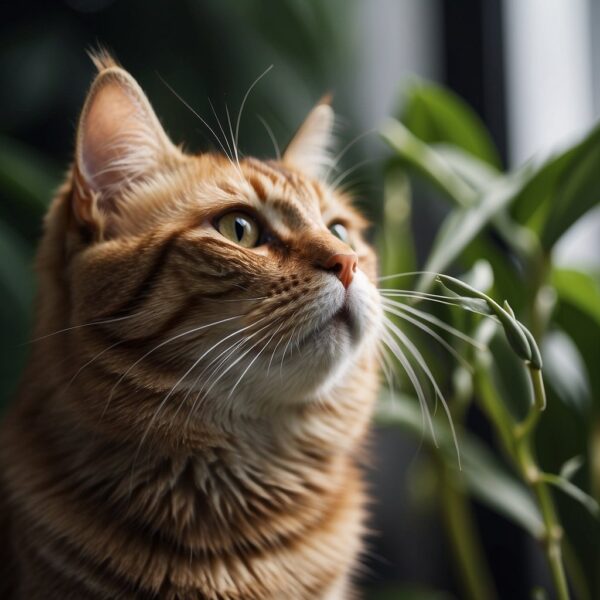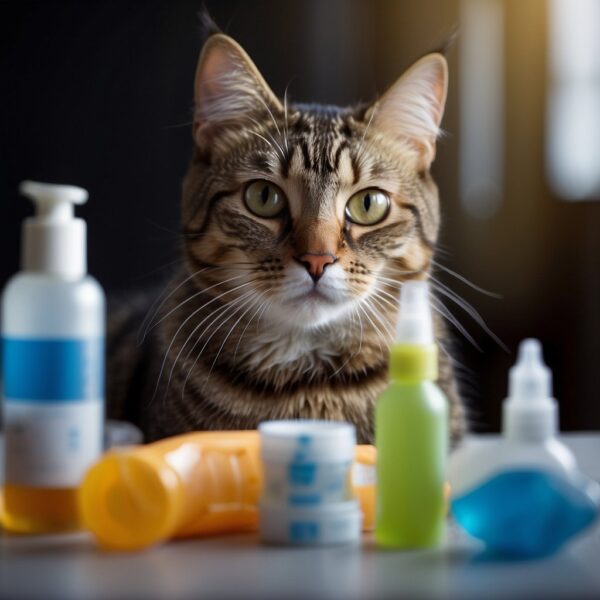
Why Do Cats Sneeze? Uncovering the Common Causes
Cats sneeze for various reasons, much like humans. It’s a natural response of the feline body to clear the nasal passages of irritants or foreign objects. While sneezing in cats is often benign, frequently dismissed as a cute quirk of our feline friends, it can sometimes be indicative of underlying health issues. Occasional sneezes might be inconsequential, but a pattern of frequent sneezing requires attention as it may signal anything from a simple allergic reaction to more complex respiratory infections.
Understanding the why behind a cat’s sneeze guides guardians on appropriate actions and when to seek veterinary care. Allergens such as pollen, dust, or even strong odors can instigate sneezing, while viral or bacterial infections could also be culprits. Dental health problems can present themselves through sneezing due to the close proximity of the tooth roots to the nasal passages. The key is to note the frequency and accompanying symptoms to distinguish between a minor annoyance and a significant health concern.
Key Takeaways
- Sneezing in cats can be a normal reflex or a sign of health issues.
- A variety of triggers can cause sneezing, from dental diseases to respiratory infections.
- Observing a cat’s sneezing patterns and related symptoms is crucial for their wellbeing.
Understanding the Fundamentals of Feline Sneezing
In exploring why cats sneeze, it is essential to comprehend the mechanics involved and recognize the difference between typical sneezing occurrences and signs of potential health issues.
Definition and Mechanics of a Sneeze
A sneeze is a forceful expulsion of air through the nasal passages in response to irritation or foreign bodies. This reflex action is a cat’s natural method to clear its nasal passages of irritants or obstructions.
Common Causes of Sneezing in Cats
- Allergens: Cats can sneeze when exposed to various allergens such as pollen, mold, or dust.
- Dental Issues: Dental infections can allow food particles to enter the nasal passages, causing sneezing.
- Infections: Viral, bacterial, or fungal respiratory infections can lead to sneezing.
- Polyps: Benign growths in the nasal passages or sinuses can trigger sneezing.
- Chemical Irritants: Household cleaning agents and perfumes may cause sneezing if inhaled by cats.
Distinguishing Normal from Excessive Sneezing
- Normal Sneezing: Occasional sneezes due to temporary irritants are common.
- Excessive Sneezing: Persistent or frequent sneezing, especially when accompanied by discharge, may indicate health concerns requiring veterinary attention.

Allergic Reactions and Environmental Factors
Cats can experience allergic reactions and sensitivity to various environmental factors, often exhibiting symptoms like sneezing and skin irritation. Understanding these triggers is crucial for ensuring feline well-being.
Common Allergies in Cats
Cats, like humans, can develop allergies to many substances. These allergens can cause a range of reactions, with sneezing being a prominent sign. The most typical allergens affecting cats include:
- Pollen: Cats can be allergic to different types of pollen, leading to seasonal sneezing.
- Dust Mites: These tiny creatures are a common source of allergies in cats, living in household dust and fabrics.
- Mold: Mold spores can trigger an allergic reaction, causing respiratory symptoms in sensitive cats.
- Chemicals: Certain chemicals found in cleaning products or fragrances may irritate a cat’s respiratory system.
Allergies in cats can also manifest in the skin, causing skin irritation or itching.
Environmental Irritants and Cat Sneezing
Apart from allergies, cats’ sneezing can be caused by a variety of environmental irritants. Exposure to these may result in acute episodes of sneezing to remove the irritants from their nasal passages. Common irritants include:
- Smoke: Tobacco smoke or other types of smoke can be harsh on a cat’s respiratory system.
- Perfumes: Strong fragrances may cause sneezing fits in cats.
- Cleaning Agents: Some household cleaning agents contain volatile compounds that can be irritating.
- Dust and Pollutants: High levels of dust or air pollution can lead to sneezing.
Maintaining a clean environment and using hypoallergenic products can help minimize exposure to these irritants.

Understanding Cat Sneezing Related to Viral Infections
Cat sneezing is often symptomatic of underlying viral infections that affect the respiratory system. These infections can have varying degrees of severity and may require clinical attention.
Feline Herpesvirus and Its Impact
Feline herpesvirus-1 (FHV-1), commonly referred to as feline herpes, is a significant cause of respiratory infections in cats. The virus primarily manifests through symptoms including:
- Sneezing
- Nasal discharge
- Conjunctivitis (inflammation of the eye)
Infected cats might also show signs of lethargy and reduced appetite. FHV-1 is highly contagious, and while treatments can alleviate symptoms and manage the condition, cats remain carriers for life.
Other Viral Infections Causing Sneezing
In addition to feline herpesvirus, other viruses contribute to sneezing in cats:
- Feline calicivirus (FCV)
- Causes respiratory diseases similar to FHV-1.
- Symptoms can include oral ulcers and pneumonia.
- Other viruses
- A myriad of less common viral infections can also lead to sneezing.
- Some may present with more generalized symptoms like fever or loss of appetite.
Management of these viral infections typically centers around supportive care and preventing secondary bacterial infections. Vaccinations can serve as a preventative measure against some viral causes of sneezing in cats.
The Role of Foreign Bodies and Nasal Obstructions
Cats can sneeze due to a variety of reasons, and one notable cause is the presence of foreign bodies or nasal obstructions. These can trigger sneezing as a reflex to clear the nasal passages.
Detecting Nasal Obstructions
Nasal obstructions in cats can range from nasal polyps to benign growths. Rhinoscopy, a procedure involving the insertion of a thin camera into the nose, is often utilized by veterinarians to detect such blockages. Signs that suggest the presence of nasal obstructions include consistent sneezing, nasal discharge, or breathing difficulties.
Response and Removal of Foreign Bodies
When a cat inhales a foreign body, like a blade of grass or a small object, sneezing occurs as a natural response to dislodge the irritant. If the object does not expel through sneezing, veterinary intervention may be necessary. Veterinarians may perform rhinoscopy or use specialized tools to grasp and remove the foreign body.

Medical Concerns Associated with Cat Sneezing
Cat sneezing can often be a minor issue, but it can also indicate medical concerns ranging from respiratory infections to dental diseases. Recognizing the underlying issues and seeking appropriate veterinary care are crucial for a cat’s health.
Identifying Respiratory Infections
Respiratory infections are a leading cause of sneezing in cats. They can stem from both viral and bacterial pathogens. The two most common infectious agents include:
- Feline herpes virus: A virus that causes upper respiratory problems, often accompanied by eye issues and a runny nose.
- Calicivirus: Associated with respiratory issues and oral ulcers.
Other bacteria, such as Chlamydia, Bordetella, and Mycoplasma, can contribute to respiratory infections. Symptoms of respiratory infections may include:
- Fever
- Loss of appetite
- Congestion and coughing
Other Health Issues Leading to Sneezing
Apart from infections, various health concerns can cause sneezing. Significant ones include:
- Dental disease: Inflammation or infection can allow food material to enter the nasal passages, leading to sneezing.
- Feline immunodeficiency virus (FIV) and feline leukemia virus (FeLV): These conditions weaken the immune system, increasing susceptibility to infections.
- Allergens or irritants: Dust, smoke, or strong odors can irritate the nasal passages.
- Cancer or polyps: Though less common, nasal tumors or polyps can lead to chronic sneezing.
Environmental factors, such as stress, can also exacerbate or trigger respiratory conditions in cats.
When to Consult a Veterinarian
Immediate veterinarian consultation is advisable if sneezing is accompanied by:
- Persistent or severe symptoms
- Blood in nasal discharge
- Concurrent health issues
Diagnosis may include swabs, blood tests, and dental checks to identify the underlying cause. Treatments vary but may involve:
- Antibiotics: Prescribed for bacterial infections.
- Antivirals: Used to manage viral infections like feline herpes.
- Supportive care: Including fluids and nutritional support.
In some cases, dental work or surgery may be necessary to address the root cause of sneezing. Monitoring your cat’s health and maintaining regular veterinary check-ups play a pivotal role in managing sneezing and related health concerns.
Diagnosis and Treatment
When a cat presents symptoms of sneezing, it’s crucial to determine the underlying cause to administer the correct treatment. A thorough professional diagnosis is key, followed by a tailored treatment plan to manage the condition effectively.
Professional Diagnosis
A veterinarian should be consulted when a cat is sneezing persistently. The veterinarian may perform a physical examination and review the cat’s medical history. They might also recommend diagnostic tests such as:
- Nasal swabs: to check for respiratory infections,
- Dental examination: looking for dental issues that cause sneezing,
- X-rays or imaging: to detect physical obstructions or growths.
Based on the evaluation, the veterinarian can diagnose if the sneezing is caused by infections, allergies, foreign bodies, or other health issues.
Treatment Options and Management
The treatment prescribed by the veterinarian will depend on the diagnosis. Treatment options may include:
- Antibiotics: if a bacterial infection is present,
- Antivirals: for viral infections like Feline Herpesvirus,
- Removing foreign bodies: if they are the cause of sneezing,
- Managing allergies: through medication or environmental changes,
- Surgery: in cases of polyps or growths causing nasal obstruction.
In addition to medical treatments, the veterinarian may also suggest supportive care, such as:
- Ensuring the cat stays hydrated,
- Providing a clean and dust-free environment.
The management plan might involve routine follow-ups to monitor the cat’s health and adjust treatment as necessary.
Preventive Measures and Best Practices
Proactive steps can significantly minimize the incidence of sneezing in cats, stemming from various causes such as infections, allergies, and environmental stressors. Ensuring a clean living space, up-to-date vaccinations, and a stress-free environment supports a cat’s overall health and reduces sneezing episodes.
Maintaining a Healthy Environment
Ventilation: Regularly airing out the cat’s living area helps clear airborne irritants that may cause sneezing. Implementing the use of a humidifier can maintain optimal humidity levels, reducing the potential for dryness in the nasal passages.
- Cleanliness: A routine cleaning schedule is essential to remove dust, smoke, and other particulate matter. Parents should specially focus on:
- Litter box cleanliness
- Dust-free bedding
- Frequent vacuuming of areas where the cat spends time
Vaccination and Disease Prevention
Vaccines: Staying current with vaccinations is vital, as many common respiratory pathogens are preventable. Vaccinations against feline herpesvirus-1 and feline calicivirus, for example, can reduce the occurrence of respiratory infections leading to sneezing.
- Regular Check-ups: Annual vet visits allow early detection and treatment of dental issues or diseases that can cause sneezing. These should include:
- Oral health assessments
- Updates on necessary vaccines
Stress Management in Cats
Routine: Cats thrive on predictability. Owners can reduce stress by providing:
- Consistent feeding times
- Regular play and interactions
- Familiar bedding and toys
Environment: Creating a peaceful home atmosphere reduces stress, which in turn lowers the likelihood of stress-induced sneezing.
- Allergen Management: Proper identification and elimination of allergens in the cat’s environment, including certain types of litter or household sprays, also prevent sneezing related to allergic reactions.

Frequently Asked Questions
This section addresses common inquiries regarding reasons behind a cat’s sneezing, potential home remedies, and guidance on when veterinary care is necessary. Through these questions, cat parents can better understand and manage their cat’s sneezing episodes.
What can cause a cat to start sneezing frequently?
Frequent sneezing in cats may be triggered by various factors, including dental infections, inhaled irritants like dust or smoke, viral infections like Feline Herpes Virus, or even allergies. Nasal obstructions such as polyps or tumors also contribute to continuous sneezing.
Are there any home remedies for a sneezing cat?
For minor sneezing due to allergens or irritants, ensuring a cat’s environment is clean, free of smoke, and well-ventilated may help. However, cautious monitoring is crucial, as home remedies are not a substitute for professional veterinary care if symptoms persist or worsen.
At what point should a sneezing cat be taken to the vet?
A cat should be taken to the vet if sneezing is persistent, accompanied by discharge from the eyes or nose, if there is blood in the sneeze, or if other symptoms such as lethargy or appetite loss are observed. These may indicate a more serious condition.
Can frequent sneezing in cats resolve without medical treatment?
Occasional sneezing often resolves on its own, especially if it is due to temporary irritants. However, frequent or chronic sneezing may require medical treatment to address the underlying cause, which can include infections or anatomical issues.
How can I care for my elderly cat that is sneezing?
Elderly cats with sneezing should be kept comfortable and in a stress-free environment. If the sneezing is due to a chronic condition, a vet might recommend a treatment plan. Consistent monitoring and regular veterinary check-ups are important to manage their health.
Is it possible for humans to be affected by a cat’s sneeze?
While the Feline Herpes Virus cannot be transmitted to humans, other pathogens found in a cat’s sneeze could potentially affect individuals with compromised immune systems. Standard hygiene practices, like hand washing, can minimize the risk of transmission.